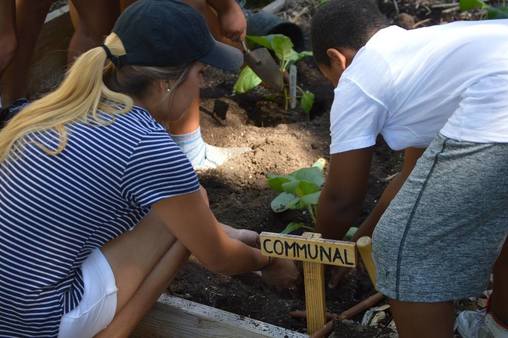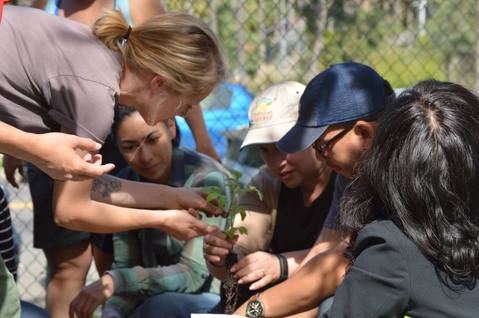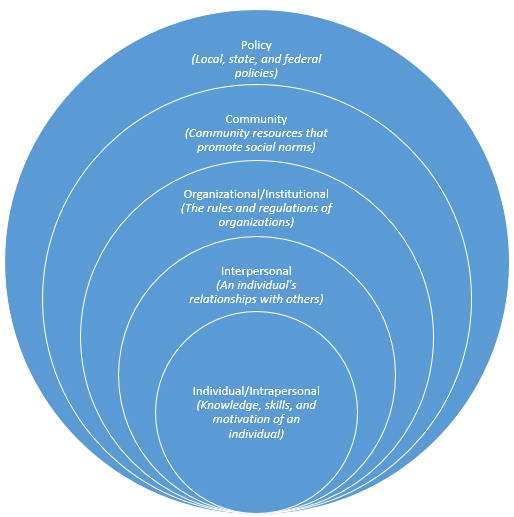Seeds of Hope's work, methods, and impact while working with the California Department of Public Health's Nutrition Education and Obesity Prevention project have been extensively researched, analyzed, and quantified. The results are available in Volume 16, December 2019 issue of Preventive Medicine Reports. Click Here to read the full report.
Our Approach
Seeds of Hope uses the Social-Ecological model to shape our public health work. This model and its theory provide a contextual framework for every aspect of our programs. The model also helps demonstrate how different factors intersect to influence a person's food and lifestyle choices. Below is a rendering of the Social-Ecological model. On this page, we will provide examples of how our programs touch every layer and create a synergy to ultimately impact individual behavior.
Public Policy
Every aspect of the social-ecological model is equally important, but as citizens in a representative democracy we have a duty to demand policy that can help us lead healthier lives. We have teamed up with two great organizations to build coalitions around shared policy ideas that come directly from the communities in which we serve.
The Los Angeles Food Policy Council – The Los Angeles Food Policy Council (LAFPC) is “a collective impact initiative, working to make Southern California a Good Food region for everyone—where food is healthy, affordable, fair and sustainable.”
Community Health Councils - Community Health Councils is: “ A non-profit, community-based health promotion and policy organization based in Los Angeles. For more than twenty years, Community Health Councils (CHC) has led efforts to eliminate disparities in health by expanding coverage, increasing access to healthcare, and improving the environment in areas with inadequate resources for health living.”
Through our collaborations with the LA Food Policy Council and Community Health Councils, we have worked to influence legislation and provide guidance to lawmakers to create real change in policy at the state and local level.
Our work on these councils includes accomplishments such as:
AB551 at the State Level - Find more information here.
EBT at Farmers Markets in Los Angeles Community - Find more information here.
The Los Angeles Food Policy Council – The Los Angeles Food Policy Council (LAFPC) is “a collective impact initiative, working to make Southern California a Good Food region for everyone—where food is healthy, affordable, fair and sustainable.”
Community Health Councils - Community Health Councils is: “ A non-profit, community-based health promotion and policy organization based in Los Angeles. For more than twenty years, Community Health Councils (CHC) has led efforts to eliminate disparities in health by expanding coverage, increasing access to healthcare, and improving the environment in areas with inadequate resources for health living.”
Through our collaborations with the LA Food Policy Council and Community Health Councils, we have worked to influence legislation and provide guidance to lawmakers to create real change in policy at the state and local level.
Our work on these councils includes accomplishments such as:
AB551 at the State Level - Find more information here.
EBT at Farmers Markets in Los Angeles Community - Find more information here.
Community

Through the Social-Ecological model, our community approach is multi-faceted. By tackling public health issues within communities, not from afar, we are able to receive input on a real-time basis from participants about our work and adjust or double down as necessary. Our goals are always to create a sense of community through exhibiting the cultural values that are already present within it. Working in communities of faith, it is important to reflect these values in everyday interactions. No matter what faith tradition we are working with; Christianity, Judaism, Islam, the universal value to love your neighbor as yourself is practiced.
Communal gardens planted on unused or underutilized church property are essential to the work we do. Gardens and the tending of them have been linked to multiple health benefits. In the journal, Social Science and Medicine, researchers suggest “the physical and social qualities of garden participation awaken the senses and stimulate a range of responses that influence interpersonal processes (learning, affirming, expressive experiences) and social relationships that are supportive of positive health-related behaviors and overall health.” This research implies that gardening, especially with a group working towards a collective goal, is not only a physically healthy activity to participate in, but also impacts our social skills and supports overall health. This is exactly the type of work we promote and take part in. Our church gardens act as meeting places where community members can come together and socialize while doing the meaningful work of growing food.
Seeds of Hope edible gardens are predominantly located in urban areas. Using the broken windows theory, we aim to make our gardens as aesthetically pleasing as possible, as a way to show the community that they deserve a beautiful space to congregate. Our gardens also provide green space in parts of the city that otherwise lack them. They provide a safe, neutral meeting place for neighbors and church members to come together. They are welcoming spaces, that keep trash and other blight out and foster change in the community. These attributes of our garden influence the social determinants of health within our communities and positively impact overall community health.
Communal gardens planted on unused or underutilized church property are essential to the work we do. Gardens and the tending of them have been linked to multiple health benefits. In the journal, Social Science and Medicine, researchers suggest “the physical and social qualities of garden participation awaken the senses and stimulate a range of responses that influence interpersonal processes (learning, affirming, expressive experiences) and social relationships that are supportive of positive health-related behaviors and overall health.” This research implies that gardening, especially with a group working towards a collective goal, is not only a physically healthy activity to participate in, but also impacts our social skills and supports overall health. This is exactly the type of work we promote and take part in. Our church gardens act as meeting places where community members can come together and socialize while doing the meaningful work of growing food.
Seeds of Hope edible gardens are predominantly located in urban areas. Using the broken windows theory, we aim to make our gardens as aesthetically pleasing as possible, as a way to show the community that they deserve a beautiful space to congregate. Our gardens also provide green space in parts of the city that otherwise lack them. They provide a safe, neutral meeting place for neighbors and church members to come together. They are welcoming spaces, that keep trash and other blight out and foster change in the community. These attributes of our garden influence the social determinants of health within our communities and positively impact overall community health.
Organizational
As a Diocesan ministry, it is our job to make our resources, talents and capacity available to churches that are willing to take on the work of food justice. Food justice can mean different things to different congregations, we do however, strongly encourage all Diocesan churches to adopt as many ministries with a focus on food justice as possible. These ministries include starting a food pantry or other types of fresh produce distribution, creating a garden on church property, finding partners to offer cooking and nutrition classes, healthy coffee hour adoption aligning with our Diocesan food policy, and a host of other options.
Through food pantries and fresh produce distribution, Seeds of Hope assists congregations in providing community members with nutrient-dense ingredients to take home and make meals for their families. In certain circumstances when food pantry participants are also experiencing homelessness, Seeds of Hope provides handheld fruits and vegetables and canned goods that can be eaten raw or by simply heating them up.
At food pantries where Seeds of Hope plays an organizing and supportive role, we also provide cooking classes with a recipe featuring the produce being given away.
Through food pantries and fresh produce distribution, Seeds of Hope assists congregations in providing community members with nutrient-dense ingredients to take home and make meals for their families. In certain circumstances when food pantry participants are also experiencing homelessness, Seeds of Hope provides handheld fruits and vegetables and canned goods that can be eaten raw or by simply heating them up.
At food pantries where Seeds of Hope plays an organizing and supportive role, we also provide cooking classes with a recipe featuring the produce being given away.
Interpersonal

Individuals have been coming to church for spiritual guidance for centuries. In addition to spiritual guidance, church has provided a sense of community for its members for just as long. Seeds of Hope harnesses the power of these communities to make healthy changes in the church setting that will hopefully influence individuals to change their own lives. Individuals have been coming to church for spiritual guidance for centuries. In addition to spiritual guidance, church has provided a sense of community for its members for just as long. Seeds of Hope harnesses the power of these communities to make healthy changes in the church setting that will hopefully influence individuals to change their own lives.
Food is a major part of church, it is served at almost every event and in between Sunday services. Food is a way to bring a community together. Whenever food is served, Seeds of Hope views this as a way to change the idea of what types of foods can be served at certain occasions. Doing this on a regular basis creates norms within the social network of the church that have a long-term impacts on families.
Every Seeds of Hope event is an opportunity to build a community that shares our values and will exhibit those values in their everyday lives with their families, friends, and social networks. We try to instill love, passion, positivity, humility, and many other values in our interactions with our event participants. We hope this is contagious, guiding others to adopt and share these values with others.
Food is a major part of church, it is served at almost every event and in between Sunday services. Food is a way to bring a community together. Whenever food is served, Seeds of Hope views this as a way to change the idea of what types of foods can be served at certain occasions. Doing this on a regular basis creates norms within the social network of the church that have a long-term impacts on families.
Every Seeds of Hope event is an opportunity to build a community that shares our values and will exhibit those values in their everyday lives with their families, friends, and social networks. We try to instill love, passion, positivity, humility, and many other values in our interactions with our event participants. We hope this is contagious, guiding others to adopt and share these values with others.
Individual
Seeds of Hope’s main mission is to empower church communities and individuals to take control of their health through providing nutrition and cooking education, gardening workshops, and physical activity training. We believe that knowledge leads to empowerment.
For our cooking and nutrition classes, the knowledge we share covers a range of subjects. From building a healthy plate using all five food groups, to shopping on a budget, to rethinking our drink choices. We do realize, however, that sharing knowledge only gets us so far, so we incorporate cooking skills and flavor training into all of our classes. Research suggests we can talk about nutrition and how good certain foods are for us, but if those foods do not taste good, they will not be consumed. With this in mind, we strive to enhance flavors using seasonings and sauces that are easy to make yet super flavorful.
Seeds of Hope uses gardening workshops to give hands-on training to individuals who predominantly live in places where the most easily accessible foods are ultra-processed and unhealthy. Through these gardening workshops, we provide seedlings, seeds, soil, pots and even the space for participants to grow their own food on church property. We believe these workshops also empower participants to go forth and garden themselves.
For our cooking and nutrition classes, the knowledge we share covers a range of subjects. From building a healthy plate using all five food groups, to shopping on a budget, to rethinking our drink choices. We do realize, however, that sharing knowledge only gets us so far, so we incorporate cooking skills and flavor training into all of our classes. Research suggests we can talk about nutrition and how good certain foods are for us, but if those foods do not taste good, they will not be consumed. With this in mind, we strive to enhance flavors using seasonings and sauces that are easy to make yet super flavorful.
Seeds of Hope uses gardening workshops to give hands-on training to individuals who predominantly live in places where the most easily accessible foods are ultra-processed and unhealthy. Through these gardening workshops, we provide seedlings, seeds, soil, pots and even the space for participants to grow their own food on church property. We believe these workshops also empower participants to go forth and garden themselves.


